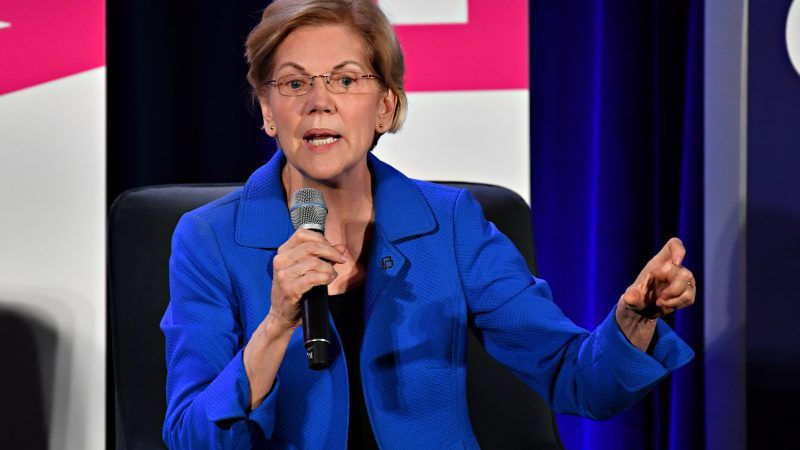Elizabeth Warren's Labor Plan Would Be Terrible For Workers
Among other things, it would end Uber as we know it.

"We cannot have a truly democratic society with so little power in the hands of working people," presidential contender Elizabeth Warren wrote in her lengthy labor plan, which she released Thursday in advance of a candidate forum hosted by the Service Employees International Union (SEIU). "That's why returning power to working people will be the overarching goal of my presidency." But under the guise of empowering the working class, the Massachusetts senator's plan actually gives an awful lot of power to the federal government—and harms workers in the process.
Warren wants to end "worker misclassification as 'independent contractors,'" by making misclassifying workers a violation of federal labor law. If she gets her way, she could kill ridesharing and other gig economy businesses.
Warren's plan proposes a federal version of California's A.B. 5, which classified Uber drivers and other gig workers as employees, not contractors. Since it wouldn't be a Warren plan without heavy union emphasis, she also notes that gig workers will be able to unionize once they're properly classified.
Backers of the California law call it a win for gig workers, arguing that workers are now guaranteed sick leave, overtime pay, and the minimum wage. Yet in practice the law makes it harder for workers to set their own hours, use a gig job as supplemental income, or work for multiple companies at once. Survey data show that these are all reasons why Uber drivers choose such work.
One result of such laws is that drivers for ridesharing services become more expensive to keep on because they now require benefits. The pool of drivers to hire would also shrink, since many people want an Uber gig for the flexibility it provides; many people are looking for an ad hoc arrangement, not full-time work. Beacon Economics LLC, a public policy research firm, estimates that a company like Lyft might hire 300,000 fewer workers in California alone due to the cost increases caused by such laws.
The costs associated with upending the ridesharing business model will also be passed on to consumers in the form of higher prices. With higher prices, fewer workers, and less flexible gigs, the entire ridesharing business model could collapse.
Much of Warren's proposal is framed as an attempt to ensure workers can confront unsafe, unfair, or contract-violating labor conditions. But her solution is to create a federal government that has far more authority to meddle in private arrangements. It's less about empowering workers and more about empowering federal bureaucrats.
For example, under Warren's proposal, companies that make $1 billion or more annually would be forced to add workers to their boards until they comprise 40 percent of the overall body. A corporate board is supposed to protect and maximize shareholders' assets; workers do not always have the same incentives or specialized knowledge necessary to carry out that fiduciary duty.
Warren would also raise the minimum wage to $15 an hour, including for tipped workers. Warren's plan frames the new minimum wage as a way to boost worker earnings. But the most likely outcome of a national $15 minimum is that restaurants and bars—which already operate on ultra-thin margins—would pay for the higher wages by laying people off and aggressively upping menu prices.
Many workers who make the majority of their salary via tips actually want to keep it that way. When Washington, D.C., raised the tipped wage to $15 an hour, many of the city's service industry workers objected on the grounds that it would actually cost them money. The plan was eventually overturned.
Warren's plan tries to address a variety of smaller issues too, including allowing graduate students to unionize, guaranteeing fairer scheduling practices, and banning both public and private employers from asking workers about their salary history (a measure that has already been implemented in more than a dozen states). Noncompete contracts would be prohibited under a Warren presidency. These parts of the plan are basically a grab bag of policy proposals that for the most part invite even more bureaucratic intrusion into private companies' inner workings, dictating in rather specific terms what workers should want.
Warren has a whole section of her plan entitled "Increasing Worker Choice and Control" but for the most part her plan just increases the federal government's control. Workers shouldn't anticipate more choice at all, especially if they enjoy a flexible work schedule as an Uber driver or make the majority of their income via (hard-earned!) tips as a bartender. Consumers will lose out, too, in the form of higher costs for many of the services that make their lives easier and better—if those companies stay in business at all.


Show Comments (70)